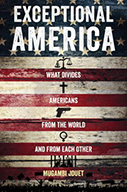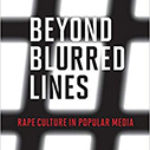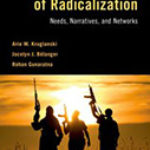Exceptional America: What Divides Americans From The World And From Each Other

Author: Mugambi Jouet
Publisher: Oakland, CA: University of California Press, 2017. 376p.
Reviewer: Jasper M. Trautsch | March 2020
Interpreting “exceptional” to simply mean “unique”, “different”, “unusual,” “extraordinary,” and “peculiar” (4), Mugambi Jouet explores what distinguishes the U.S. from the rest of the world in general, and from Europe in particular, finding seven features of American society that single it out. These features are analyzed in a chapter each: a) widespread anti-intellectualism, b) the profound influence of organized religion on politics, c) the fact that issues such as abortion, contraception, and homosexuality are objects of “culture wars,” d) the widespread social and political acceptance of astonishing wealth inequality, e) the fact that millions of Americans regularly vote against their economic self-interest, f) mass incarceration and harsh penal laws unequalled in the Western world, and g) pervasive ignorance about the rest of the world.
Of particular interest to readers of Criminal Law and Criminal Justice Books will be the chapter in which Americans’ attitudes towards crime and punishment are compared to those in other countries. About a quarter of all prisoners worldwide languish in U.S. jails or, put differently, one percent of Americans are locked up in prison, as Jouet reveals. America is the only Western country still clinging to the death penalty — the number of people sentenced to death in the U.S. equaling those of Saudi Arabia, China, North Korea, and Yemen. America also stands almost alone in her obsession with guns, which are sold at gun shows without any background checks. Only two other nations (Guatemala and Mexico) have constitutional provisions allowing their citizens to bear arms. As a result, as Jouet claims, America has the highest murder rate and most gun violence in the Western world. Jouet blames Christian fundamentalism (with its tendency to view the world in dichotomous terms of good and evil), the democratization of the justice system (with judges and prosecutors being elected rather than appointed and thus more responsive to popular calls for vengeful justice), anti-intellectualism (resulting in psychological and sociological experts having less influence on penal policies), wealth inequality (poverty fostering crime), and racism (racial minorities being overrepresented in prisons and receiving harsher punishments) for this toxic “cocktail poisoning American justice” (227).
Exceptional America: What Divides Americans from the World and from Each Other is a knowledgeable, learned, and erudite update of Seymour Martin Lipset’s American Exceptionalism: A Double-Edged Sword from 1996. Summarizing pertinent studies from the fields of political science, sociology, economics, and history, Jouet provides an excellent overview of what divides the U.S. from the rest of the West (which he defines to include Western Europe, North America, Australia, and New Zealand) and, importantly, what the causes of these differences are. What distinguishes his monograph, moreover, is the fact that Jouet does not argue that America as a whole is different from the rest of the world, but that it is actually only Americans on the political right who hold unusual views, whereas U.S. liberals mostly share a similar political outlook with Europeans and other Westerners. Finally, Jouet’s account of American exceptionalism is intriguing, as he argues that America’s most admirable and most disturbing characteristics cannot be neatly set apart, but are intrinsically linked. For example, he points out that many of the features of American society that foreigners find perplexing – such as Christian fundamentalism, the retention of capital punishment, and hostility towards intellectuals – are the result of America’s thoroughly democratic character. While in Europe higher education is generally viewed positively, in the U.S. it is often interpreted as a sign of elitism; “common sense” being deemed more democratic than a university degree. In Europe, the death penalty was abolished despite the fact that in most countries there were popular majorities in favor of retaining it, because political elites considered it the rightful thing to do; in America’s traditionally democratic society, to thus defy the popular will, by contrast, seems impossible. Christian fundamentalism in America derives, at least in part, from the belief that everyone should take the Bible literally and not have an educated priest from an established church interpret and contextualize it for them, and that the purpose of a church service should be to touch everyone’s heart, not to stimulate the intellect of the learned few.
While Jouet’s claims and arguments are generally based on solid empirical evidence, major terms and concepts he uses could have been critically discussed in more depth. For one, scholars of American exceptionalism, having studied the complexity of the concept and its changing functions for American nationalism, will probably be disappointed by his offhand equation of exceptionalism with uniqueness. To Jouet, American exceptionalism means that the U.S. “is objectively different from other countries” (263). However, if it is simply differentness, then every nation would by definition be, or could claim to be, exceptional. Moreover, while briefly acknowledging that “‘conservatism’ tends to have a deeply different meaning in America than other Western nations” (6), Jouet does not further explore the causes and effects of this semantic divergence, even though the concept of conservatism is central to his argument, which is, in a nutshell, that America is exceptional, because allegedly it is the only Western country with a strong “conservative” element: “While liberal America is mainly evolving in the same direction as the rest of the West, conservative America has become an outlier because of its unusual ideology” (6). Jouet is certainly correct in identifying America’s political right as a highly peculiar movement. However, it might be misleading to call its ideology “conservative”, without providing a definition of the term – all the more so, since Jouet, a Kenyan-born Frenchman, strongly emphasizes that the book has been written from a Tocquevillian perspective. After all, from a European point of view, conservatism – with its self-confident elitism, its belief in the need for hierarchical orders, and its skeptical view of human nature and hence popular democracy – is the very thing that America lacks, as Louis Hartz, in a by-now classic treatment of American exceptionalism, famously argued in The Liberal Tradition in America in 1955 (a work Jouet does not cite). Therefore, one might wonder whether it would not have been more accurate to instead use the concept of right-wing populism to describe many of the phenomena Jouet skillfully analyzes.
This criticism about concepts and semantics notwithstanding, Jouet has written a timely and undoubtedly important book that is full of politically significant scholarly insights. Exceptional America, deftly analyzing a host of peculiar features characterizing American society, should be read both by Americans wishing to reflect on the causes of their country’s profound polarization and by non-Americans seeking to better understand a nation that, despite its pervasive cultural influence, at times appears strange and unfathomable.
Dr. Jasper M. Trautsch, Senior Lecturer in Modern History Humboldt University of Berlin Germany


